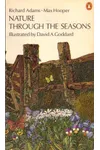Picture an English storyteller who turned bedtime tales for his daughters into a global literary phenomenon—meet Richard Adams! Best known for his enchanting fantasy novel Watership Down, Adams wove rich worlds filled with courage, nature, and adventure. His journey from a modest civil servant to an award-winning author is as inspiring as the stories he crafted.
Born in 1920, Adams didn’t set out to be a writer, but his vivid imagination and love for storytelling shaped a legacy that continues to captivate readers worldwide. Let’s dive into the life and works of this remarkable author!
The Making of Richard Adams
Richard George Adams was born on May 9, 1920, in Newbury, Berkshire, England. Growing up surrounded by the lush English countryside, he developed a deep connection to nature, which later became a hallmark of his writing. After serving in World War II, Adams studied history at Oxford University and settled into a stable career as a civil servant in the British Civil Service. But his creative spark ignited when he began inventing stories for his two daughters, Juliet and Rosamond, during long car rides. These tales of rabbits and their epic adventures laid the foundation for his literary breakthrough.
Richard Adams’s Unforgettable Stories
Adams’s debut novel, Watership Down (1972), is a masterpiece of fantasy and anthropomorphic storytelling. What began as a story for his daughters evolved into an epic tale of a group of rabbits seeking a new home, brimming with themes of leadership, survival, and community. Its rich mythology and vivid landscapes earned it the Carnegie Medal and the Guardian Children’s Fiction Prize, cementing Adams’s place in literary history.
Beyond Watership Down, Adams explored diverse genres. His Shardik (1974), part of the Beklan Empire series, is a darker, more philosophical tale centered on a sacred bear and a primitive empire, showcasing his ability to craft complex, immersive worlds. The Plague Dogs (1977) tackles animal experimentation with gritty realism, following two dogs escaping a research facility. Adams’s writing blends lush prose, deep empathy for animals, and profound moral questions, making his stories resonate with readers of all ages.
Other notable works include Maia (1984), a sprawling Beklan Empire novel, and Tales from Watership Down (1996), a collection revisiting his beloved rabbit world. His ability to balance adventure with introspection set him apart as a storyteller who could entertain and provoke thought.
Why Richard Adams Matters
Richard Adams’s impact transcends his books. Watership Down redefined anthropomorphic fiction, inspiring countless authors and adaptations, including an animated film and a Netflix series. His focus on environmental and ethical themes—whether the destruction of habitats in Watership Down or animal rights in The Plague Dogs—resonates in today’s eco-conscious world. Adams’s stories remind us of the power of courage, community, and the natural world, leaving a legacy that endures long after his passing in 2016.
His work also bridged generations, appealing to both children and adults with its universal themes and sophisticated storytelling. Writers and readers continue to draw inspiration from his ability to transform simple ideas into profound narratives.
About Richard Adams
- Born: May 9, 1920, Newbury, Berkshire, England
- Key Works: Watership Down, Shardik, The Plague Dogs
- Awards: Carnegie Medal (1972), Guardian Children’s Fiction Prize (1972)
- Died: December 24, 2016
Snag a copy of Watership Down and dive into Richard Adams’s enchanting world of adventure and heart!

























